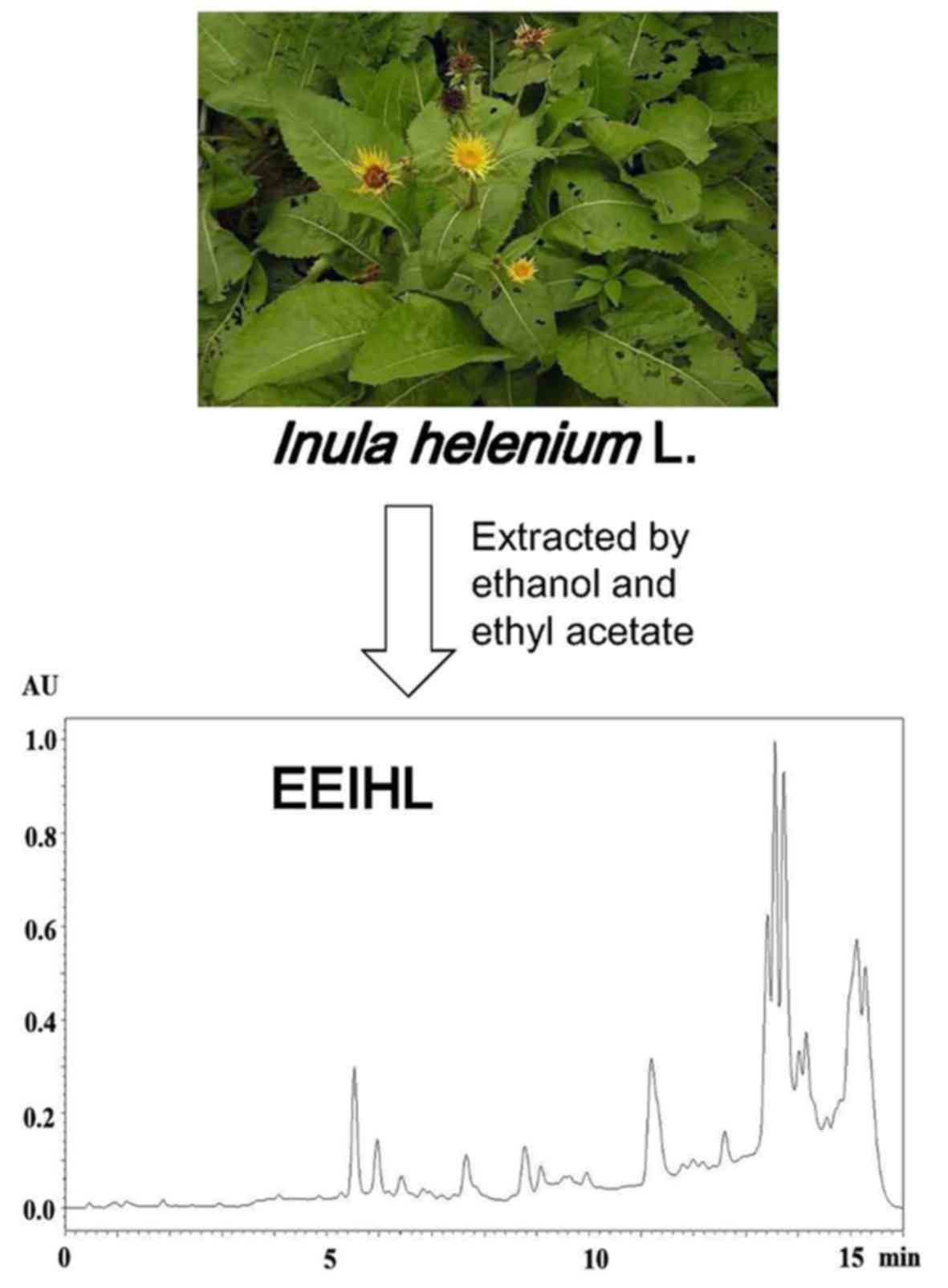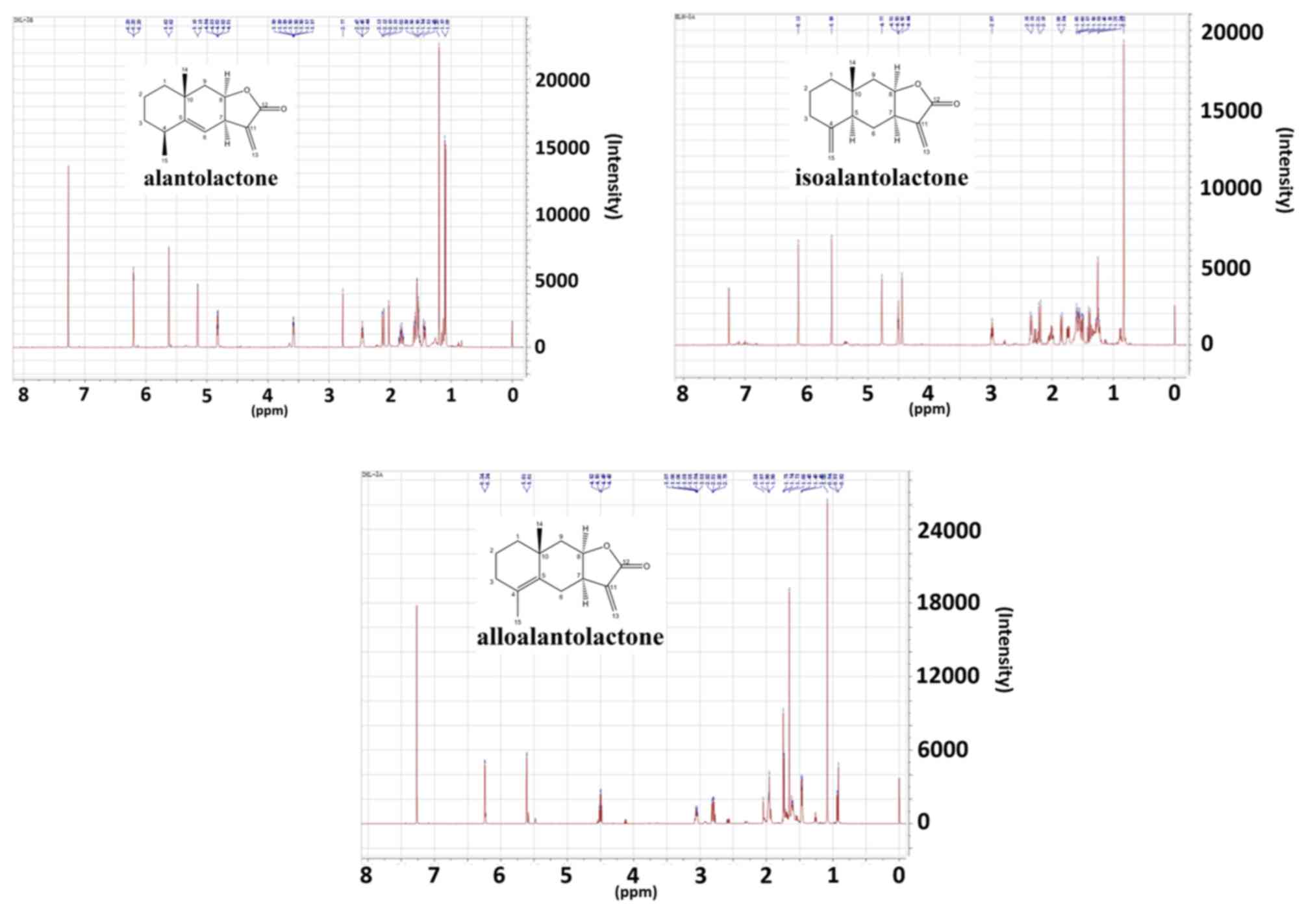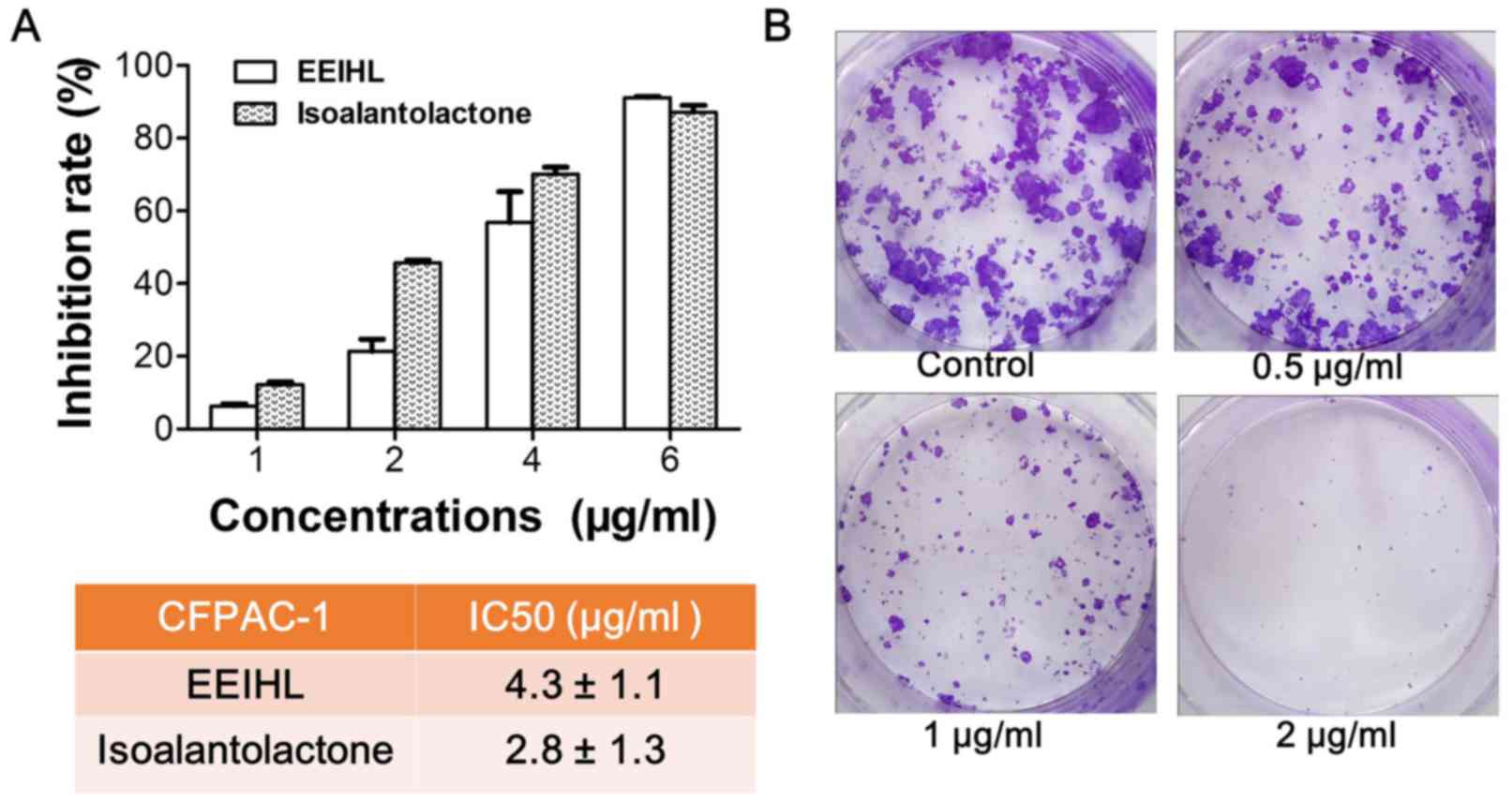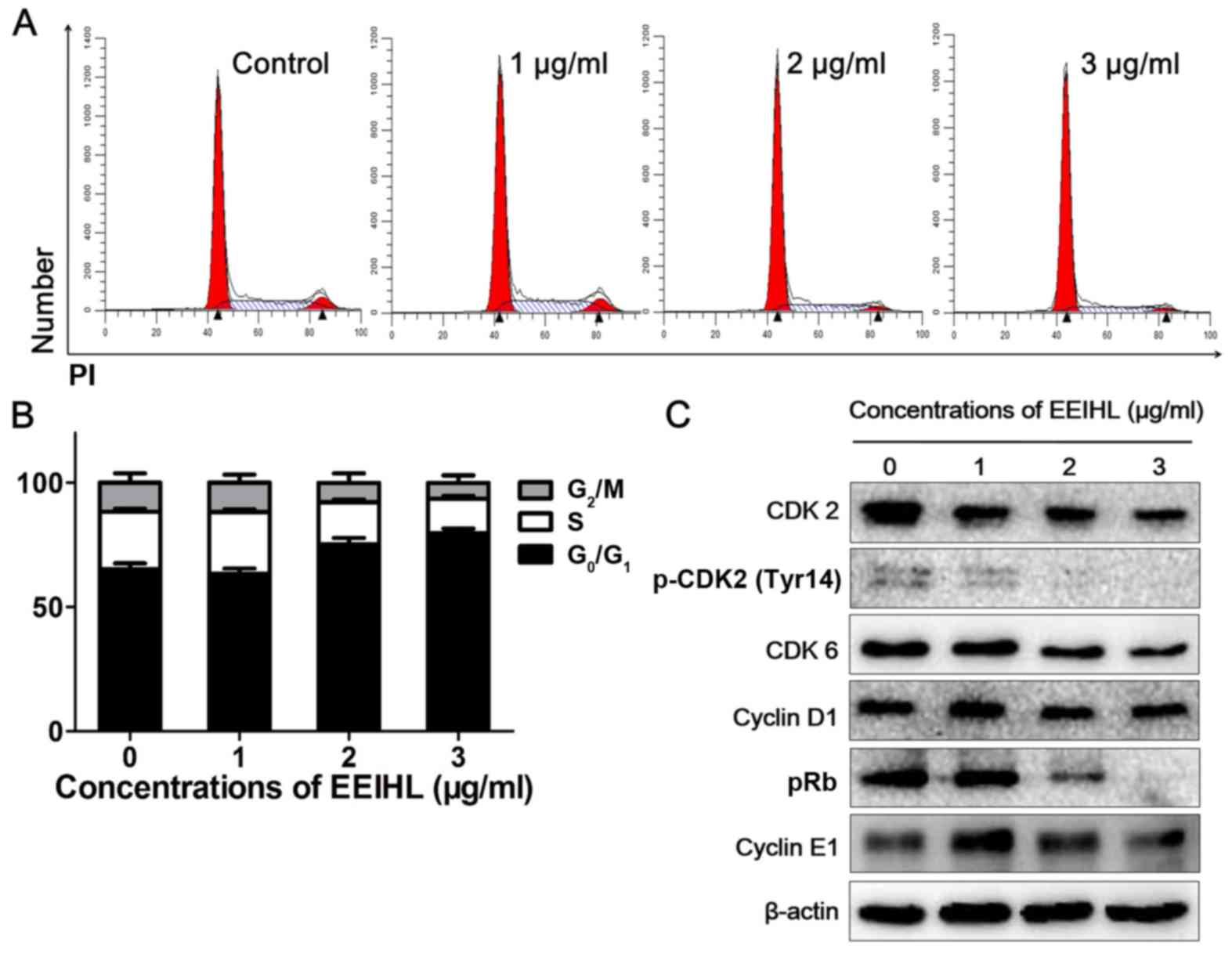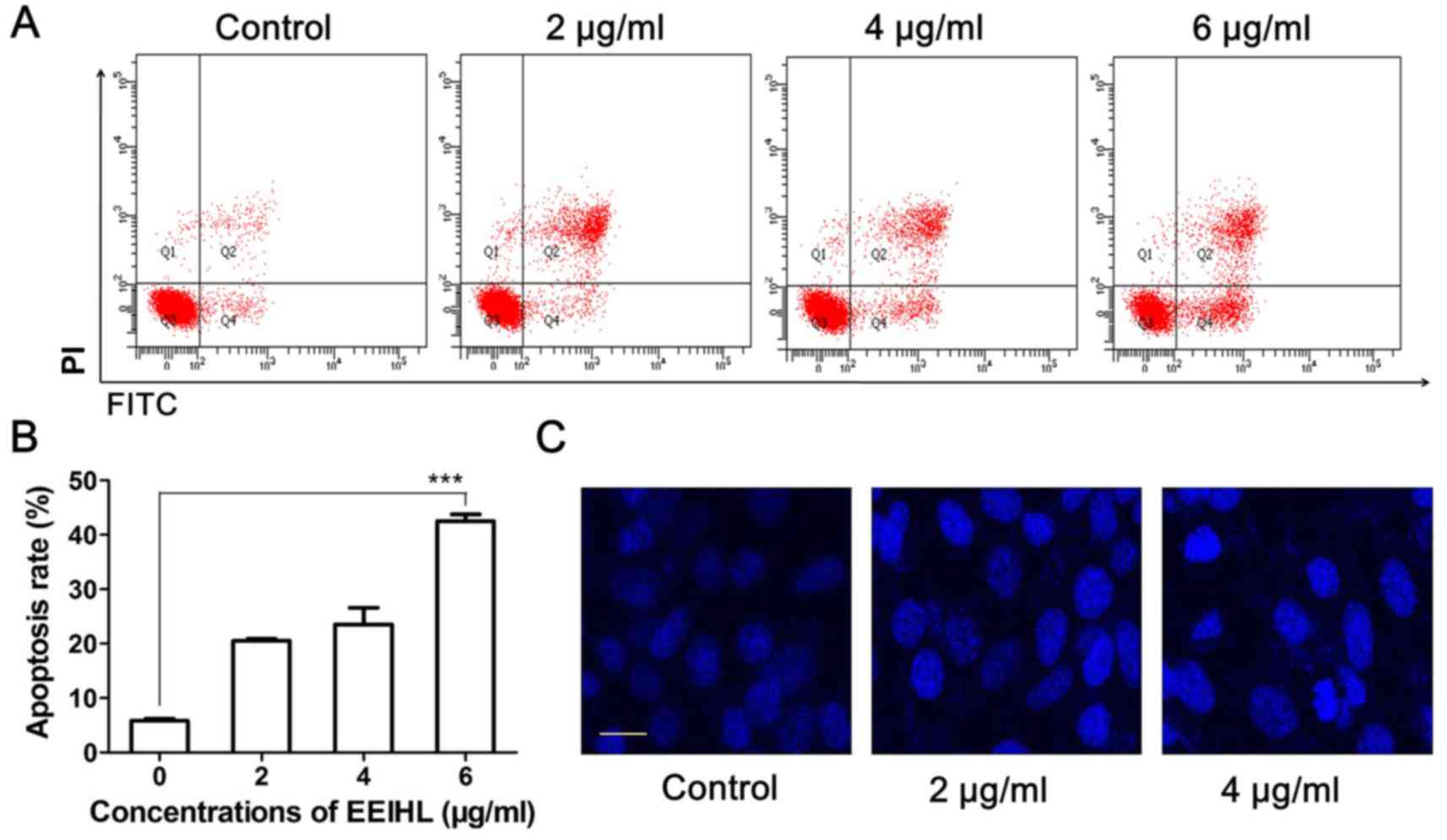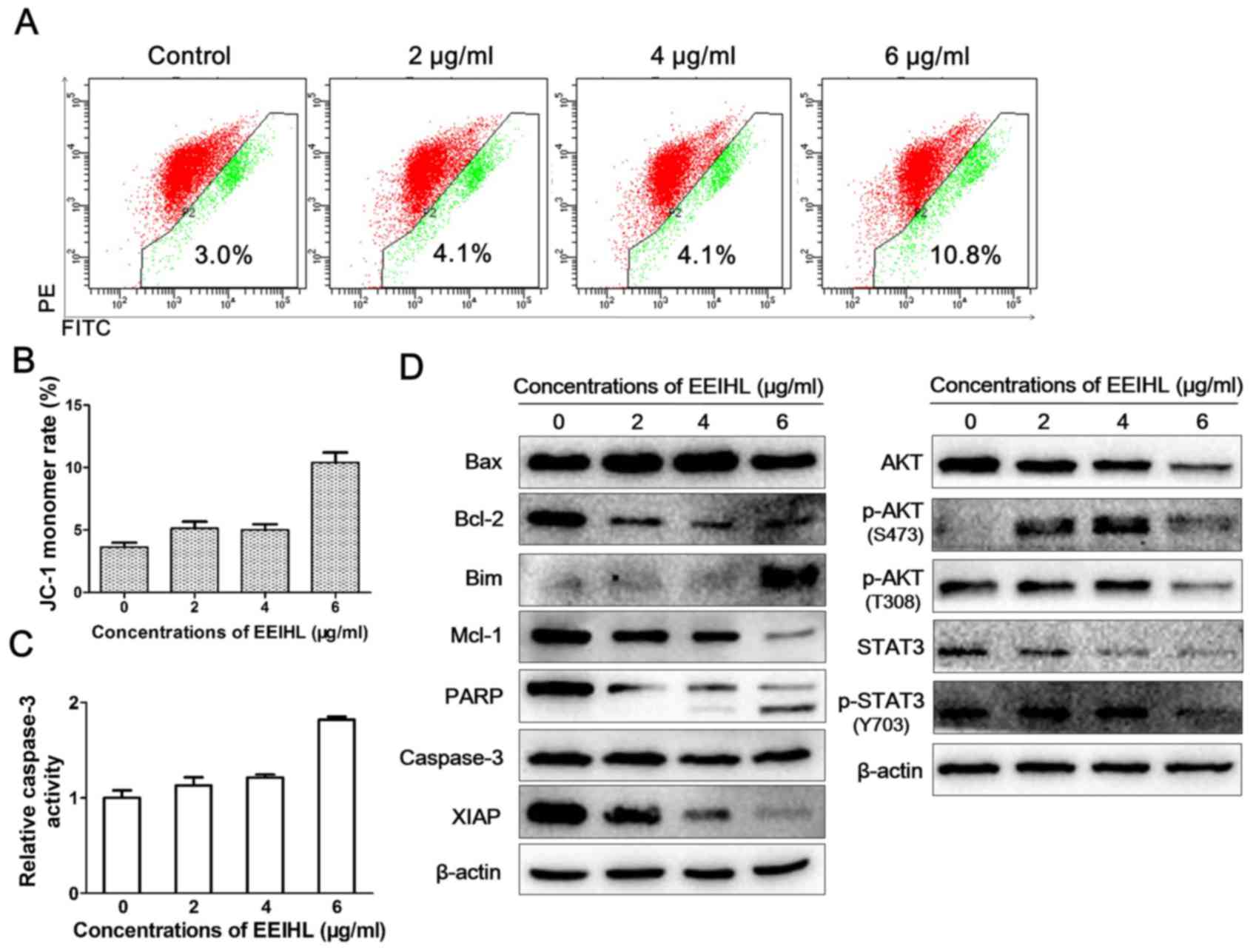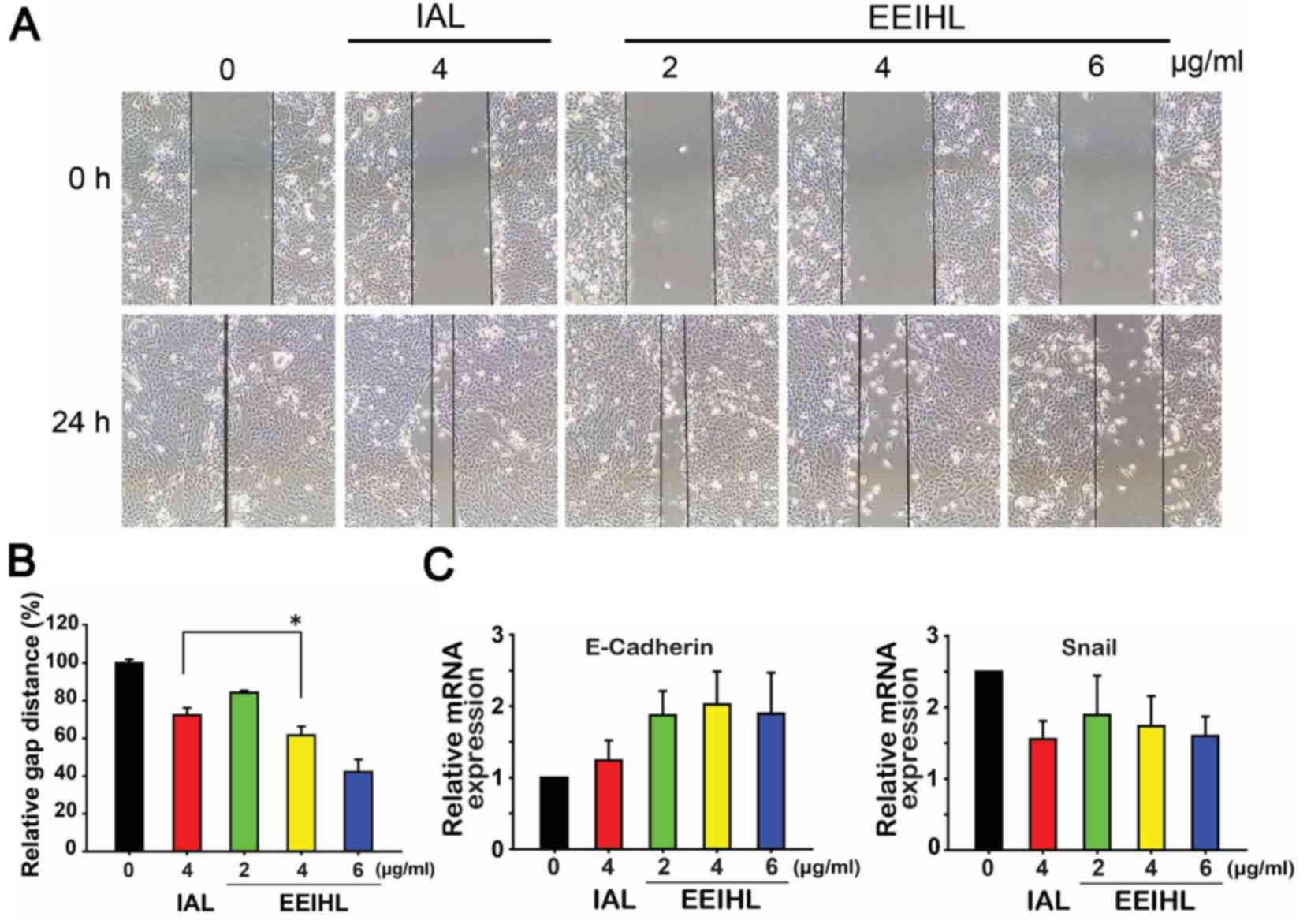|
1
|
Rahib L, Smith BD, Aizenberg R, Rosenzweig
AB, Fleshman JM and Matrisian LM: Projecting cancer incidence and
deaths to 2030: The unexpected burden of thyroid, liver, and
pancreas cancers in the United States. Can Res. 74:2913–2921. 2014.
View Article : Google Scholar
|
|
2
|
Bailey P, Chang DK, Nones K, Johns AL,
Patch AM, Gingras MC, Miller DK, Christ AN, Bruxner TJ, Quinn MC,
et al: Genomic analyses identify molecular subtypes of pancreatic
cancer. Nature. 531:47–52. 2016. View Article : Google Scholar : PubMed/NCBI
|
|
3
|
Garrido-Laguna I and Hidalgo M: Pancreatic
cancer: From state-of-the-art treatments to promising novel
therapies. Nat Rev Clin Oncol. 12:319–334. 2015. View Article : Google Scholar : PubMed/NCBI
|
|
4
|
Vincent A, Herman J, Schulick R, Hruban RH
and Goggins M: Pancreatic cancer. Lancet. 378:607–620. 2011.
View Article : Google Scholar : PubMed/NCBI
|
|
5
|
Seca AM, Grigore A, Pinto DC and Silva AM:
The genus Inula and their metabolites: From ethnopharmacological to
medicinal uses. J Ethnopharmacol. 154:286–310. 2014. View Article : Google Scholar : PubMed/NCBI
|
|
6
|
Stojanović-Radić Z, Comić LJ, Radulović N,
Blagojević P, Denić M, Miltojević A, Rajković J and
Mihajilov-Krstev T: Antistaphylococcal activity of Inula helenium
L. root essential oil: Eudesmane sesquiterpene lactones induce cell
membrane damage. Eur J Clin Microbiol Infect Dis. 31:1015–1025.
2012. View Article : Google Scholar : PubMed/NCBI
|
|
7
|
Qiu J, Luo M, Wang J, Dong J, Li H, Leng
B, Zhang Q, Dai X, Zhang Y, Niu X and Deng X: Isoalantolactone
protects against Staphylococcus aureus pneumonia. FEMS Microbiol
Lett. 324:147–155. 2011. View Article : Google Scholar : PubMed/NCBI
|
|
8
|
Ghantous A, Gali-Muhtasib H, Vuorela H,
Saliba NA and Darwiche N: What made sesquiterpene lactones reach
cancer clinical trials? Drug Discov Today. 15:668–678. 2010.
View Article : Google Scholar : PubMed/NCBI
|
|
9
|
Jiang HL, Chen J, Jin XJ, Yang JL, Li Y,
Yao XJ and Wu QX: Sesquiterpenoids, alantolactone analogues, and
seco-guaiene from the roots of Inula helenium. Tetrahedron.
67:9193–9198. 2011. View Article : Google Scholar
|
|
10
|
Zhang S, Won YK, Ong CN and Shen HM:
Anti-cancer potential of sesquiterpene lactones: Bioactivity and
molecular mechanisms. Curr Med Chem. 5:239–249. 2005.
|
|
11
|
Wang J, Zhao YM, Tian YT, Yan CL and Guo
CY: Ultrasound-assisted extraction of total phenolic compounds from
Inula helenium. ScientificWorldJournal. 2013:1575272013.PubMed/NCBI
|
|
12
|
Park EJ, Kim YM, Park SW, Kim HJ, Lee JH,
Lee DU and Chang KC: Induction of HO-1 through p38 MAPK/Nrf2
signaling pathway by ethanol extract of Inula helenium L. reduces
inflammation in LPS-activated RAW 264.7 cells and CLP-induced
septic mice. Food Chem Toxicol. 55:386–395. 2013. View Article : Google Scholar : PubMed/NCBI
|
|
13
|
Guo CY, Wang J, Hou Y, Zhao YM, Shen LX
and Zhang DS: Orthogonal test design for optimizing the extraction
of total flavonoids from Inula helenium. Pharmacogn Mag. 9:192–195.
2013. View Article : Google Scholar : PubMed/NCBI
|
|
14
|
Ahmed AF, Al-Qahtani JH, Al-Yousef HM,
Al-Said MS, Ashour AE, Al-Sohaibani M and Rafatullah S:
Proanthocyanidin-rich date seed extract protects against chemically
induced hepatorenal toxicity. J Med Food. 18:280–289. 2015.
View Article : Google Scholar : PubMed/NCBI
|
|
15
|
Du J, Shi HR, Ren F, Wang JL, Wu QH, Li X
and Zhang RT: Inhibition of the IGF signaling pathway reverses
cisplatin resistance in ovarian cancer cells. BMC Cancer.
17:8512017. View Article : Google Scholar : PubMed/NCBI
|
|
16
|
Ding YL, Wang YZ, Zhang J, Zhang QZ, Zhang
JY and Jin H: Application of the vanillin sulfuric acid
colorimetry-ultraviolet spectrometry on quality evaluation of Panax
notoginseng. Guang Pu Xue Yu Guang Pu Fen Xi. 33:471–475. 2013.(In
Chines). PubMed/NCBI
|
|
17
|
Konishi T, Shimada Y, Nagao T, Okabe H and
Konoshima T: Antiproliferative sesquiterpene lactones from the
roots of Inula helenium. Biol Pharm Bull. 25:1370–1372. 2002.
View Article : Google Scholar : PubMed/NCBI
|
|
18
|
Weng Z, Gao H, Hu J, Fan Y, Wang H and Li
L: Isoalantolactone induces autophagic cell death in SKOV3 human
ovarian carcinoma cells via upregulation of PEA-15. Oncol Rep.
35:833–840. 2016. View Article : Google Scholar : PubMed/NCBI
|
|
19
|
Di W, Khan M, Rasul A, Sun M, Sui Y, Zhong
L, Yang L, Zhu Q, Feng L and Ma T: Isoalantolactone inhibits
constitutive NF-κB activation and induces reactive oxygen
species-mediated apoptosis in osteosarcoma U2OS cells through
mitochondrial dysfunction. Oncol Rep. 32:1585–1593. 2014.
View Article : Google Scholar : PubMed/NCBI
|
|
20
|
Zaima K, Wakana D, Demizu Y, Kumeta Y,
Kamakura H, Maruyama T, Kurihara M and Goda Y: Isoheleproline: A
new amino acid-sesquiterpene adduct from Inula helenium. J Nat Med.
68:432–435. 2014. View Article : Google Scholar : PubMed/NCBI
|
|
21
|
Chen CN, Huang HH, Wu CL, Lin CP, Hsu JT,
Hsieh HP, Chuang SE and Lai GM: Isocostunolide, a sesquiterpene
lactone, induces mitochondrial membrane depolarization and
caspase-dependent apoptosis in human melanoma cells. Cancer Lett.
246:237–252. 2007. View Article : Google Scholar : PubMed/NCBI
|
|
22
|
Zhao YM, Wang J, Liu HB, Guo CY and Zhang
WM: Microwave-assisted Extraction of Alantolactone and
Isoalantolactone from Inula helenium. Indian J Pharm Sci.
77:116–120. 2015. View Article : Google Scholar : PubMed/NCBI
|
|
23
|
Cai H, Meng X, Li Y, Yang C and Liu Y:
Growth inhibition effects of isoalantolactone on K562/A02 cells:
Caspase-dependent apoptotic pathways, S phase arrest, and
downregulation of Bcr/Abl. Phytother Res. 28:1679–1686. 2014.
View Article : Google Scholar : PubMed/NCBI
|
|
24
|
Wang J, Cui L, Feng L, Zhang Z, Song J,
Liu D and Jia X: Isoalantolactone inhibits the migration and
invasion of human breast cancer MDA-MB-231 cells via suppression of
the p38 MAPK/NF-κB signaling pathway. Oncol Rep. 36:1269–1276.
2016. View Article : Google Scholar : PubMed/NCBI
|
|
25
|
Khan M, Ding C, Rasul A, Yi F, Li T, Gao
H, Gao R, Zhong L, Zhang K, Fang X and Ma T: Isoalantolactone
induces reactive oxygen species mediated apoptosis in pancreatic
carcinoma PANC-1 cells. Int J Biol Sci. 8:533–547. 2012. View Article : Google Scholar : PubMed/NCBI
|
|
26
|
Zhang M, Hou Y, Shen Y, Guo X, Shang D and
Zhang D: Probucol reverses homocysteine induced inflammatory
monocytes differentiation and oxidative stress. Eur J Pharmacol.
818:67–73. 2018. View Article : Google Scholar : PubMed/NCBI
|
|
27
|
Yao Y, Xia D, Bian Y, Sun Y, Zhu F, Pan B,
Niu M, Zhao K, Wu Q, Qiao J, et al: Alantolactone induces G1 phase
arrest and apoptosis of multiple myeloma cells and overcomes
bortezomib resistance. Apoptosis. 20:1122–1133. 2015. View Article : Google Scholar : PubMed/NCBI
|
|
28
|
Chen YW, Hsiao PJ, Weng CC, Kuo KK, Kuo
TL, Wu DC, Hung WC and Cheng KH: SMAD4 loss triggers the phenotypic
changes of pancreatic ductal adenocarcinoma cells. BMC Cancer.
14:1812014. View Article : Google Scholar : PubMed/NCBI
|
|
29
|
Zhang X, Cao J, Pei Y, Zhang J and Wang Q:
Smad4 inhibits cell migration via suppression of JNK activity in
human pancreatic carcinoma PANC-1 cells. Oncol Lett. 11:3465–3470.
2016. View Article : Google Scholar : PubMed/NCBI
|
|
30
|
Yang G, Murashige DS, Humphrey SJ and
James DE: A positive feedback loop between Akt and mTORC2 via SIN1
phosphorylation. Cell Rep. 12:937–943. 2015. View Article : Google Scholar : PubMed/NCBI
|
|
31
|
Sarbassov DD, Guertin DA, Ali SM and
Sabatini DM: Phosphorylation and Regulation of Akt/PKB by the
Rictor-mTOR Complex. Science. 307:1098–1101. 2005. View Article : Google Scholar : PubMed/NCBI
|
|
32
|
Guo Y, Zang Y, Lv L, Cai F, Qian T, Zhang
G and Feng Q: IL-8 promotes proliferation and inhibition of
apoptosis via STAT3/AKT/NF-κB pathway in prostate cancer. Mol Med
Rep. 16:9035–9042. 2017. View Article : Google Scholar : PubMed/NCBI
|
|
33
|
Saitoh M, Endo K, Furuya S, Minami M,
Fukasawa A, Imamura T and Miyazawa K: STAT3 integrates cooperative
Ras and TGF-β signals that induce Snail expression. Oncogene.
35:1049–1057. 2016. View Article : Google Scholar : PubMed/NCBI
|
|
34
|
Yu M, Xue H, Wang Y, Shen Q, Jiang Q,
Zhang X, Li K, Jia M, Jia J, Xu J and Tian Y: miR-345 inhibits
tumor metastasis and EMT by targeting IRF1-mediated mTOR/STAT3/AKT
pathway in hepatocellular carcinoma. Int J Oncol. 50:975–983. 2017.
View Article : Google Scholar : PubMed/NCBI
|
|
35
|
Kim HN, Narayanan NK, Lasano S and
Narayanan B: Modulation of PGE2-induced EP4 expression on snail
signaling and the impact on epithelial-mesenchymal transition:
Significance of EP4 antagonism. Anticancer Res. 31:4347–4357.
2011.PubMed/NCBI
|
|
36
|
Shi Y, Zuo D, Wang X, Han M and Wu Y:
shRNA-mediated silencing of TARBP2 inhibits NCI-H1299 non-small
cell lung cancer cell invasion and migration via the JNK/STAT3/AKT
pathway. Mol Med Rep. 14:3725–3730. 2016. View Article : Google Scholar : PubMed/NCBI
|















